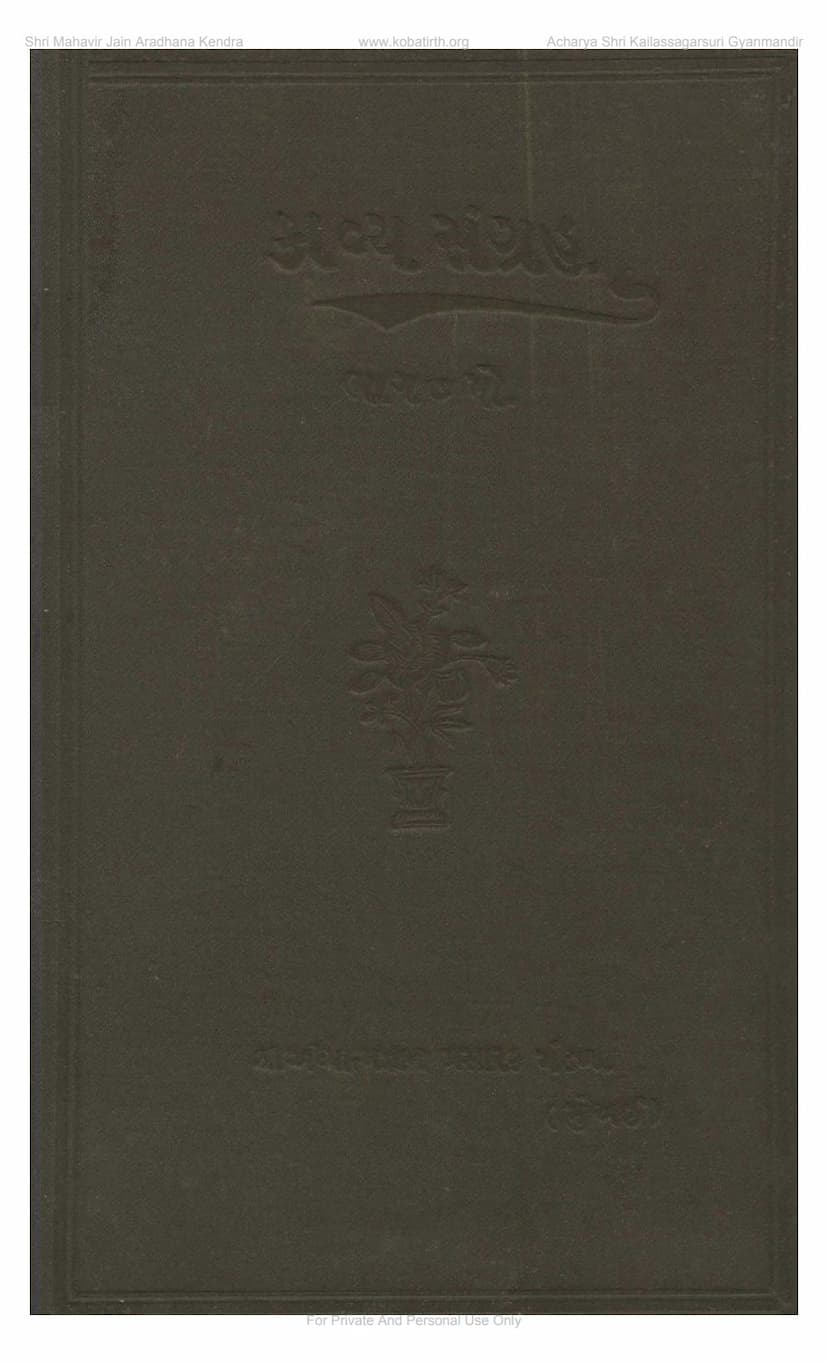Kavya Sangraha Part 7
Added to library: September 2, 2025

Summary
Here's a comprehensive summary of "Kavya Sangraha Part 7" by Buddhisagar, based on the provided text:
Title: Kavya Sangraha Part 7 Author: Muniraj Shrimad Buddhisagarji Publisher: Shri Adhyatma Gyan Prasarak Mandal Language: Gujarati (as indicated by the text)
Overview:
Kavya Sangraha Part 7 is the seventh installment in a collection of poems authored by the esteemed Jain muni, Shrimad Buddhisagarji. This volume, like its predecessors, is dedicated to presenting spiritual, philosophical, and ethical teachings through the medium of poetry. The poems are intended to inspire readers towards self-improvement, detachment from worldly pleasures, perseverance in difficult times, and the cultivation of virtuous qualities.
Key Themes and Content:
The collection covers a wide range of themes relevant to spiritual and moral upliftment, including:
- Spiritual Knowledge (Adhyatma Gyan): Many poems delve into the nature of the soul, the path to liberation, and the understanding of ultimate reality.
- Detachment and Renunciation (Vairagya): The poems emphasize the impermanence of worldly possessions and pleasures, encouraging a detachment from them to focus on spiritual growth.
- Patience and Fortitude (Dhairya): Facing adversities with equanimity and maintaining inner peace during trials are recurring motifs.
- Enthusiasm and Perseverance (Utsaha and Khant): The poems motivate readers to maintain a positive attitude and strive persistently towards their goals, both worldly and spiritual.
- Endurance of Hardships (Upsarga Sahana): The text promotes the ability to withstand difficulties and challenges without losing inner strength.
- Duty and Righteous Conduct (Kartavya Disha): Emphasis is placed on fulfilling one's duties with integrity and ethical awareness.
- Pure Love (Shuddha Prem): The poems explore the concept of selfless and divine love, distinct from worldly attachments.
- The Path of Truth (Satya Marga): Guidance is offered on adhering to truthfulness and righteousness in all aspects of life.
- Devotion (Bhakti): The collection includes verses that express deep devotion and surrender to the divine.
- Moral Virtues: The poems advocate for virtues such as forgiveness, compassion, truth, brotherhood, discernment, charity, good conduct, and knowledge.
- Self-Control: The importance of mastering one's mind, speech, and actions is highlighted, emphasizing self-discipline as a foundation for virtue.
Poetic Style and Impact:
The poems are characterized by:
- Simplicity of Language: The language used is accessible, making the profound spiritual messages understandable to a broad audience, including children.
- Emotional Depth: The verses are imbued with sincere feelings and devotional fervor, capable of touching the hearts of the readers.
- Inspirational Tone: The poems aim to uplift the reader's spirit, providing motivation and encouragement for spiritual practice and ethical living.
- Aphoristic Wisdom: Many poems contain concise, insightful teachings that can be reflected upon repeatedly.
Specific Mentions and Highlights:
- The "Nivedan" (Foreword) section notes that this is the seventh volume, following the success of the previous six. It acknowledges the financial support from Bai Parasan and Bai Rukshmani for the publication.
- The "Upo'dghat" (Introduction) discusses the nature of true poetry, distinguishing it from mere verses that might incite negative emotions. It praises the poems of Shrimad Buddhisagarji for their ability to foster positive qualities and bring peace. The introduction also draws parallels with esteemed poets from various traditions, emphasizing the enduring power of true poetry.
- The collection features a wide array of individual poems addressing specific situations, virtues, and spiritual concepts, as indicated by the detailed index ("Anukramanika"). Examples include poems on "Bhalu Kar! Sarva Jivanu" (Do Good to All Souls), "Vichari Lo Swayam Ke'va" (Reflect on Your Own Nature), "Karya Sankalp Disha" (Direction of Vow for Action), "Dhairya" (Patience), "Mitr" (Friend), and "Tatvam'si" (Thou Art That).
- The poems often use allegories and natural imagery (like rivers, gardens, lotuses, mangoes, etc.) to convey their messages effectively.
- The text frequently refers to the author's pen name, "Buddhyab'dhi" or "Buddhyab'dhi," in some of the poems.
Overall Purpose:
"Kavya Sangraha Part 7" serves as a spiritual guide and a source of moral edification for Jain followers and any individual seeking to understand and cultivate virtues like detachment, patience, righteousness, and devotion. The poems are meant to inspire readers to live a more meaningful and spiritually enriched life.